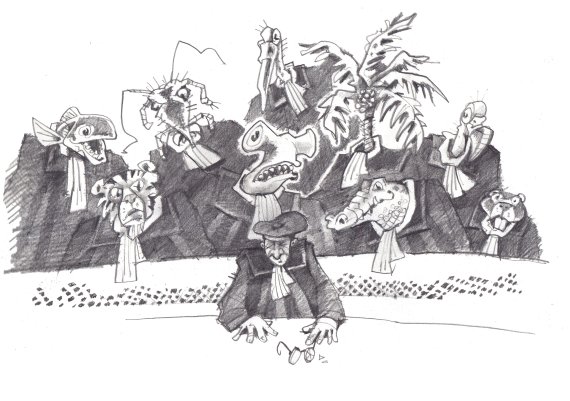Tekst: Roelof Kleis en Tessa Louwerens

Esther Turnhout
Professor of the Politics of Environmental Knowledge
‘After the IPBES report on biodiversity was published, I was asked about Wageningen’s role, and one of the reactions I got was that Wageningen should apologize. These reactions made an impression on me. They show that, in some circles at least, WUR has a reputation as an institution that is driven by the interests of industrial agriculture. We should take this seriously, whether it is true or not. Wageningen seeks to provide knowledge that has an influence on policy and on society, and that influence comes with responsibility. We need to be reflecting continuously on the effects our knowledge has and on the interests we may or may not be serving with it. That is all part of a democratic and legitimate role of the university.’

Krijn Poppe
Chief Policy Analyst, Wageningen Economic Research
‘I think we can be proud of the results of the green revolution in the Netherlands and the world. In De Peel, an area in the south-east of the country, there was severe poverty in the 1950s. Intensive livestock farming brought prosperity and regeneration. Now it has gone too far and we have environmental problems, but you don’t ask the Ford family to apologize for marketing cars. New technology often turns out to have unexpected disadvantages. I agree that WUR should not rest on its laurels and could be take a much clearer stand on the new challenges and the spirit of the times. WUR has an image as a production-minded university that responds slowly to change. To stick with cars for a moment: WUR is optimizing the diesel engine but is not doing much with electric vehicles. There is an element of truth there.’
You don’t ask the Ford family to apologize for marketing cars
Chris de Visser
Business Developer Field Crops, Wageningen Plant Research
‘For several decades now, WUR has been doing a significant amount of work on the impact of agricultural production systems on the environment. When I started here in 1984, the emphasis lay on quality and no longer on increasing yields. And quite soon the focus shifted again, to the environment. The industrialization of agriculture is largely driven by the cost price strategy farmers have to apply so as to make more and more efficient use of their resources, labour and capital. Only relatively recently did it become apparent that the decline in biodiversity is a major consequence of the agricultural practises of today. It is WUR that is taking the initiative to develop a nature-inclusive production system which does take this into account.’
David Kleijn
Professor of Plant Ecology and Nature Conservation
‘In the past, the research in Wageningen was mainly geared to producing food. Especially after World War II, the motto was: no more hunger. People were not at all concerned with biodiversity and nature: they were still abundant then. I don’t see the need to be held accountable with retroactive effect. What good does that do? It is much more useful to concentrate on solutions now: can we keep agriculture productive and create more nature and biodiversity at the same time? I can see a lot of change on that front at WUR. It used to be only the Environmental Sciences Group that thought nature and the environment were important. In the departments dealing with agriculture, efficiency came first. That is changing.’

Auke Pols
Researcher in the Knowledge, Technology and Innovation chair group
‘Ethically, I think you could say that we share the responsibility for the biodiversity problems. Damage has been done and we contributed to the causes, and it could perhaps have been done differently. What is more, it was not that no one saw it coming: The disturbing book Silent Spring was published way back in 1961. So saying sorry could be a first step. But there is a difference between apologizing for intensive farming in itself and apologizing for the way it was developed and implemented. Intensive farming had good effects too. WUR takes responsibility for tackling global challenges. It is part and parcel of that to take responsibility for the impact of the way you tackle them. A second step is to look at the research process. If we had researched and implemented intensive agriculture differently, paying more attention to system effects and winners and losers, would we have had fewer problems? And do we bear than in mind more nowadays at WUR?’

Bram Bos
In charge of process support for innovation projects at Wageningen Livestock Research
‘I think it’s a good idea for the Wageningen community to be held accountable for its role in the development of agriculture worldwide, and the effects of that. If we parade our obvious successes – and we do – we should also expose the obvious shadow sides of earlier choices. And Turnhout is right that Wageningen, and particularly DLO/ Wageningen Research, has always been part of the dominant agricultural model, even if it was only because of our research funding. And that is still going on: the calls for the Top Sector Agri & Food have to be funded by industry, which has a more limited timeframe. That means there is a big chance of knowledge being developed for application in the existing situation rather than for transformation to a better model.’

 Illustration: Henk van Ruitenbeek
Illustration: Henk van Ruitenbeek